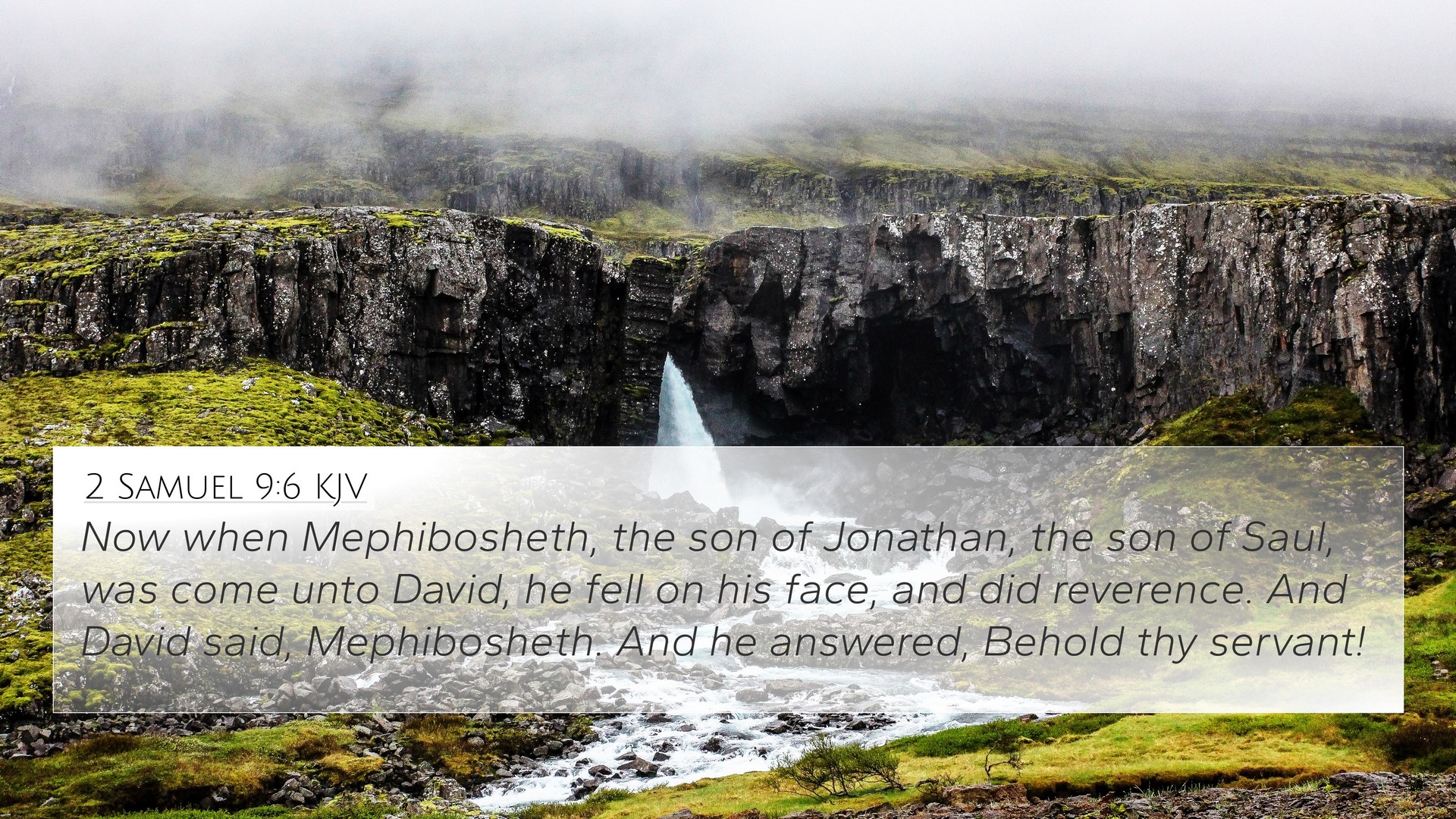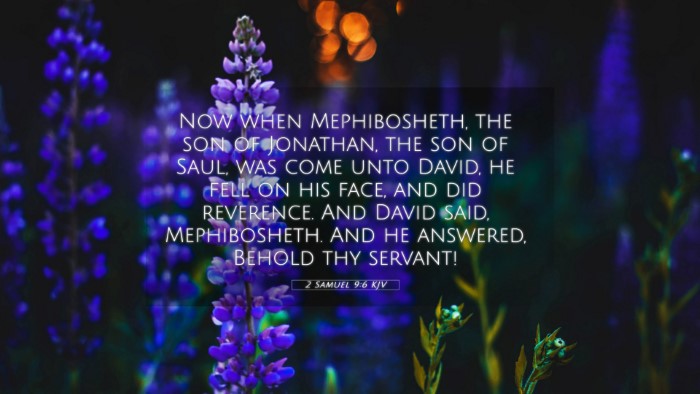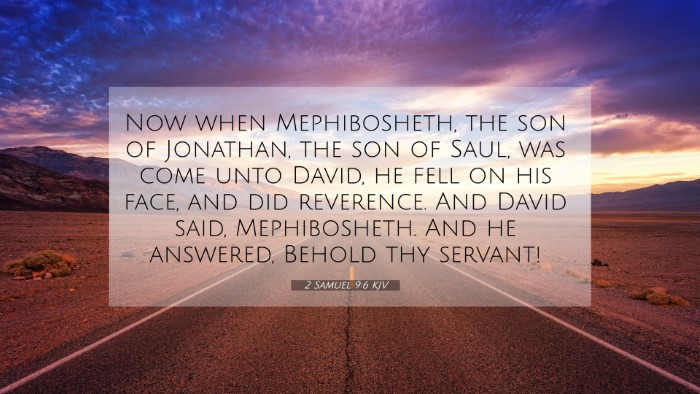Old Testament
Genesis Exodus Leviticus Numbers Deuteronomy Joshua Judges Ruth 1 Samuel 2 Samuel 1 Kings 2 Kings 1 Chronicles 2 Chronicles Ezra Nehemiah Esther Job Psalms Proverbs Ecclesiastes Song of Solomon Isaiah Jeremiah Lamentations Ezekiel Daniel Hosea Joel Amos Obadiah Jonah Micah Nahum Habakkuk Zephaniah Haggai Zechariah Malachi2 Samuel 9:6 Similar Verses
2 Samuel 9:6 Cross References
Now when Mephibosheth, the son of Jonathan, the son of Saul, was come unto David, he fell on his face, and did reverence. And David said, Mephibosheth. And he answered, Behold thy servant!
Uncover the Rich Themes and Topics of This Bible Verse
Listed below are the Bible themes associated with 2 Samuel 9:6. We invite you to explore each theme to gain deeper insights into the Scriptures.
2 Samuel 9:6 Cross Reference Verses
This section features a detailed cross-reference designed to enrich your understanding of the Scriptures. Below, you will find carefully selected verses that echo the themes and teachings related to 2 Samuel 9:6 KJV. Click on any image to explore detailed analyses of related Bible verses and uncover deeper theological insights.
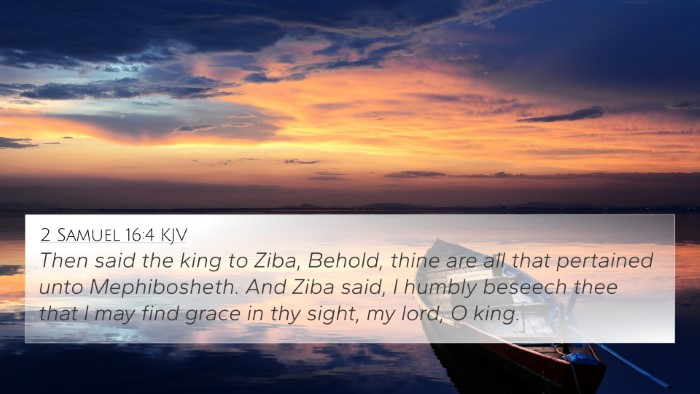
2 Samuel 16:4 (KJV) »
Then said the king to Ziba, Behold, thine are all that pertained unto Mephibosheth. And Ziba said, I humbly beseech thee that I may find grace in thy sight, my lord, O king.
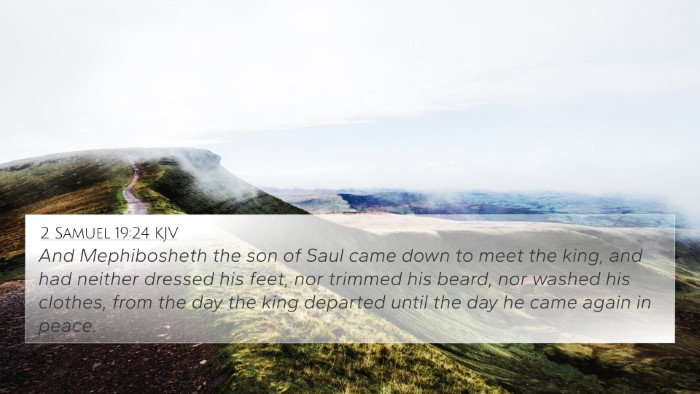
2 Samuel 19:24 (KJV) »
And Mephibosheth the son of Saul came down to meet the king, and had neither dressed his feet, nor trimmed his beard, nor washed his clothes, from the day the king departed until the day he came again in peace.

1 Samuel 25:23 (KJV) »
And when Abigail saw David, she hasted, and lighted off the ass, and fell before David on her face, and bowed herself to the ground,
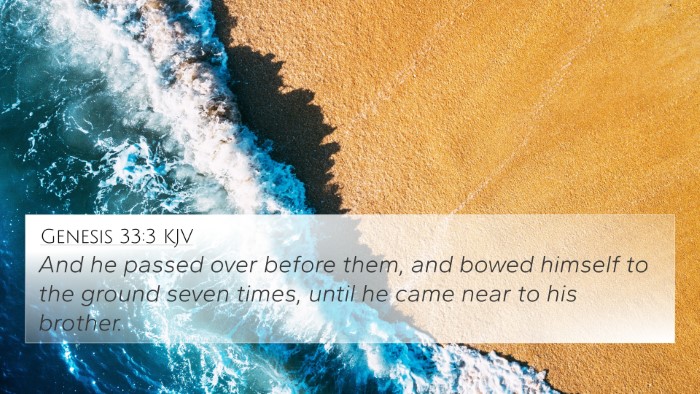
Genesis 33:3 (KJV) »
And he passed over before them, and bowed himself to the ground seven times, until he came near to his brother.
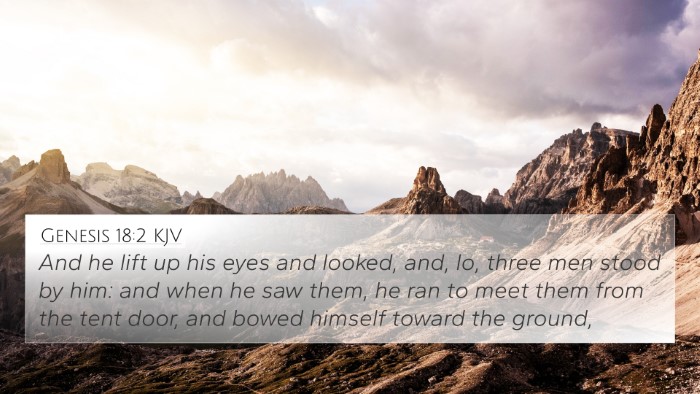
Genesis 18:2 (KJV) »
And he lift up his eyes and looked, and, lo, three men stood by him: and when he saw them, he ran to meet them from the tent door, and bowed himself toward the ground,
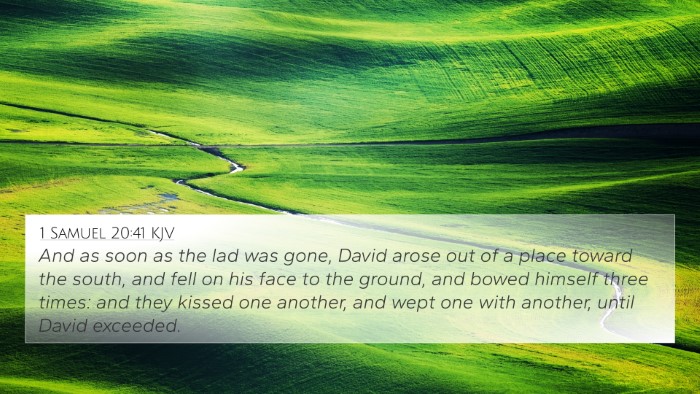
1 Samuel 20:41 (KJV) »
And as soon as the lad was gone, David arose out of a place toward the south, and fell on his face to the ground, and bowed himself three times: and they kissed one another, and wept one with another, until David exceeded.
2 Samuel 9:6 Verse Analysis and Similar Verses
2 Samuel 9:6 - Meaning and Interpretation
Verse in Context: 2 Samuel 9:6 states, "When Mephibosheth, the son of Jonathan, the son of Saul, had come to David, he fell on his face and prostrated himself. Then David said, 'Mephibosheth!' And he answered, 'Here is your servant!'
Summary of the Verse
This verse introduces Mephibosheth, the disabled son of Jonathan, who was King Saul's son. David's recognition of him emphasizes themes of grace and restoration, as he was one of Saul's heirs, living in a state of fear and insecurity. His act of prostration shows both respect and submission as he faces King David, who had previously been an enemy of his family.
Commentary Insights
-
Matthew Henry:
Matthew Henry highlights the grace shown by David towards Mephibosheth. Despite his lineage, which would typically warrant fear under a new king, David extends kindness as a reflection of his covenant with Jonathan. This act signifies the heart of God’s grace in seeking and saving those who are lost.
-
Albert Barnes:
Barnes interprets this meeting as a poignant moment of reconciliation. Mephibosheth's humility reflects his awareness of his vulnerable position. David's call to him demonstrates the openness of David's rule and his commitment to honoring his promises to Jonathan, thus illustrating the importance of loyalty and memory in relationships.
-
Adam Clarke:
Clarke notes Mephibosheth's condition and how it symbolizes a broader spiritual truth—our spiritual disabilities before God. His fall to the ground represents the proper attitude before authority. David's question, "Mephibosheth?" indicates a recognition of the individual's worth and potential, demonstrating that God's compassion reaches out to those marginalized by circumstance.
Bible Verse Cross-References
To fully understand the implications of 2 Samuel 9:6, we can explore several related verses:
- 2 Samuel 4:4: A reference to Mephibosheth’s background, detailing his injury and vulnerability as a child of Jonathan.
- 1 Samuel 20:14-15: Jonathan’s covenant with David to protect his descendants, establishing a basis for David's actions.
- 2 Samuel 9:1: David's inquiry about surviving members of Saul's family to find someone to show kindness to, illustrating his commitment to the covenant.
- Matthew 9:12: Jesus’ declaration that He came to save the sick, paralleling David’s heart of grace towards Mephibosheth.
- Romans 5:8: The ultimate expression of grace from God where Christ died for the ungodly, mirroring the unmerited kindness showed by David.
- Ephesians 2:8: The concept of grace is further emphasized, linking it to the New Testament's teaching on salvation.
- Luke 14:21: Jesus’ parable of inviting the poor, crippled, blind, and lame is reminiscent of David’s action towards Mephibosheth.
- 1 Corinthians 1:26-29: Highlights how God chooses the lowly, which aligns with David’s choice of Mephibosheth, showcasing God’s upside-down kingdom.
- Psalm 68:5: Describes God as a father to the fatherless and protector of widows, affirming His care for those in need.
- Isaiah 61:1: Proclaims the good news to the poor and binds up the brokenhearted, echoing the spirit of David's act.
Thematic Bible Verse Connections
The story of Mephibosheth reveals key themes in Biblical theology, notably the concepts of covenant, grace, and restoration. It embodies the idea that no one is beyond hope or restoration, reiterating God's promise of salvation and inclusion. The connections with Jesus Christ’s ministry present in the New Testament further establish the continuity of God’s redemptive plan throughout Scripture.
- The theme of grace is prevalent in both Old and New Testaments.
- The importance of keeping one's promises as demonstrated by David's commitment to Jonathan.
- A reminder of the transformative power of humility and submission before God.
Conclusion
2 Samuel 9:6 serves as a powerful reminder of the depths of God’s grace and the importance of our relationships with one another, as well as how they reflect our relationship with God. Mephibosheth's encounter with David illustrates the profound hope found in God’s unwavering promise to redeem those deemed lost or unworthy. As we explore the connections between Bible verses through effective cross-referencing, we gain a richer understanding of these timeless truths.
